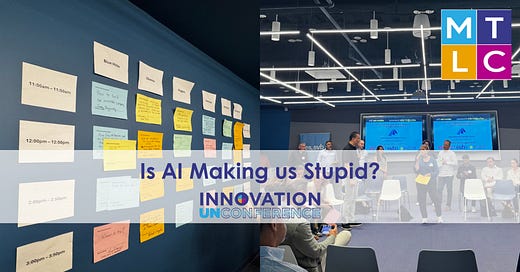Is AI Making us Stupid?
MTLC Intern Julia Littlewood examines whether the convenience of AI is quietly rewiring our cognition.
The title was provocative, but the question behind it is urgent and real. As AI tools become more integrated into daily life, are we outsourcing too much of our thinking, learning, and even our human connection to machines?
The session kicked off with a compelling metaphor: AI is the processed food of cognition. Just as processed food offers convenience at the cost of essential nutrients, AI delivers fast, easily digestible answers, but may strip away the mental effort that fuels deeper understanding and long-term cognitive well-being. Like processed food, AI can be useful, especially when access is limited, but overconsumption without awareness can lead to unintended harm.
The Double-Edged Sword of AI
The conversation explored three fundamental human capacities: searching, synthesizing, and deciding. As humans, we’ve evolved to engage in these mental processes, and in doing so, we learn and grow. AI frequently accelerates these functions, sometimes to the point of bypassing the effort that leads to insight and helps us learn. In education, we know that productive struggle is essential to lasting understanding. When AI eliminates that struggle, it may also eliminate the growth.
Yet this was not a session driven by fear. Participants highlighted the profound opportunities AI can unlock across diverse areas of life: personalized tutoring for underserved students, job interview practice for neurodivergent individuals, and expanded access to knowledge and guidance in low-resource environments. When used intentionally, AI can amplify human potential and promote inclusion.
At the same time, significant concerns emerged. Many participants worried about how AI might erode the learning process and delay the development of expertise. If AI can perform entry-level work, how do people gain the experience to progress into more advanced roles? Skipping foundational steps may save time, but it could also come at the expense of depth, skill, and long-term growth.
Another concern was the illusion of connection. AI may sound human. It may feel responsive and supportive. But it is not human, and that distinction matters. One educator shared the story of a first grader who looked up from an iPad and said, “This is bad for me.” Even children can sense when something is off. But not everyone has the skills or awareness to push back.
Preserving What Makes Us Human
So is AI making us stupid? Perhaps the better question is: what kind of thinking do we want to preserve as distinctly human? Critical reasoning, emotional judgment, and decision-making under uncertainty are still very much human skills. AI cannot replace them. Not now, and maybe not ever.
We are not going back. AI will continue to evolve, and the pace will only increase. But we still have the agency to choose how we interact with these tools. We can teach students to critique AI’s answers rather than accept them blindly. We can build guardrails and interfaces that prompt reflection instead of just speed. And we can prioritize meaningful human connection over mere convenience.
It is not about rejecting AI. It’s about protecting the parts of ourselves we can’t afford to lose.
These insights came from a session at MTLC’s 2025 Innovation Unconference.





